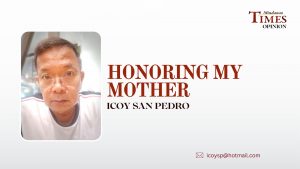BY CHRISTINE NICOLE M. TABORADA
ON MARCH 3, 2025, President Marcos Jr. signed Republic Act 12124, or the Expanded Tertiary Education Equivalency and Accreditation Program (ETEEAP). The law explicitly provides that working individuals with at least five years’ work experience in their industry to get college accreditation without going through the massive and traditional methods.
In politics and education, there are always colliding truths.
To begin with, the Philippines is likely used to the traditional way of education and learning in attaining a degree, a four-year degree program, or it depends on the specialization. Some say that the law recently signed is criticized even if it encourages diversity.
First, it is important to ensure that the Philippine educational system must continue to provide long-term advantages for people and society as well as academic integrity and attainability. When it comes to academic and quality standards, the ETEEAP law only relies on evaluating people based on their work experience and prior knowledge, which has raised concerns about the consistency and fairness of its assessment process.
Second, the law encourages weak quality compliance, and the program’s outcomes will lack the theoretical and research foundations necessary for career growth. It is truly a complicated process to evaluate citizens’ academic equality based on their employment experience. How can it guarantee that their employment experience is enough to get a degree?
Third, universities may use their own standards, particularly when evaluating a candidate’s capacity, which will result in even more irregularities in the way these degrees are awarded. In order to prevent discrimination and unfairness, it should be imperative that high authorities perform assessments on a frequent basis.
Truth be told, working people are granted access by the law, but access is clearly limited, especially in rural areas, and those younger people who have acquired skills more quickly will not be included.
Fourth, there is no assurance that employers will accept the program. In fact, employers will still continue to prioritize candidates with traditional academic backgrounds despite ETEEAP graduates bypassing formal education. Employers may not accept these degrees, which could break the program from offering its graduates possibilities for career growth and, especially, the financial investment required to earn the degree.
Lastly, even if it offers a different path to a degree, students in traditional educational settings might disagree. Compared to those who earn the same degrees in a shorter span of time, our recent graduates who take years to complete their degrees may be looked at poorly. This law will raise the question of whether experience-based learning methods should be combined into the traditional educational system.
The ETEEAP is indeed a worthwhile program that recognizes the value of practical experience in higher education. Thus, to address issues with academic standards, its assessment of fairness, accessibility, and recognition in the workplace, the law must be critically analyzed.
By protecting its regulatory structure, standardizing equivalency tests, and increasing accessibility, ETEEAP can develop into a genuinely successful program that improves chances for lifetime learning while upholding the integrity of higher education.
In conclusion, the ETEEAP law is a growing step toward inclusive education, allowing individuals who have work experience to earn college degrees. However, it raises concerns about maintaining academic standards and ensuring that practical experience is sufficient enough to be assessed to match the hardness of formal education. A proper implementation and strict evaluation are crucial to maintaining the credibility of this alternative pathway.
Unlike the brick-and-mortar standard of learning, the said law recently signed by President Marcos Jr. was put in question by the majority. Will this law be a game changer for society? Or will it only add further problems to the educational system of the Philippines?
_______________________________________________________________
Christine Nicole M. Taborada is a third-year political science student from the University of Cebu-Main Campus. She wrote this piece as part of the course requirement for their Introduction to Journalism subject.


